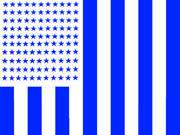| Canon
|

The very first flag of the Union (81 BBY - 80 BBY)

The old 110-star Union banner and ensign of the Union Navy, used from the acceptance of North Valand in 21 BBY until the adoption of the new 110-star banner in early 20 BBY

The new 110-star Union banner, used for a few months between early 20 BBY and the signing of the Treaty of Williamstown

An alternate 15-star Union flag, flown by those who preferred the old style of flag
The Union - a union of Earth's states, for the unity and well-being of Earth's people.
—A citizen of the Union on the Union
The Union of Earth States (also known as the Union, the Eastern States, the East, the Loyalists - Especially during the Earth Civil War, as well as the Easties, the Eastmen, the Williamites and the Williamite Empire by the Confederates) was a nation founded in 81 BBY as a closer alliance between the nations of Earth than the League of Earth Nations, the Union was intended to forge the members of the League into a single nation, intended to unite Earth and let states work closer together for mutual advantage.
Though the plan to unite Earth into one nation was continually resisted by the Traditionalist Faction, who believed that the Union should serve as little more than an alliance between Earth's nations. As the governments of the more Unionist nations recognised the superiority of the Union Senate over their own legislature, the nations of the Traditionalist Faction stubbornly refused, and often times refused to accept laws and policies enacted by the Union Senate, and maintained the primacy of their own governments over the Union Senate.
The Traditionalist Faction's stance was described as "Nation's Rights", also known by the older term of "Sovereigntism", the view that the Union Senate had no right to meddle and interfere in the affairs, laws and governance of Earth's nation states.
The U.E.S was widely regarded as peaceful, save for the near constant bickering between the Traditionalist and Federalist Factions, however it saw a few events in which it was nearly destroyed, the first was the Rum Rebellion of 79 BBY, in which members of the Union military opposed their government's increased taxes on alcohol sold to serving military members, whilst most used peaceful resistance methods, such as mass strikes, more extremist members launched a coup against the government, and nearly conquered it, the coup was defeated, but the Union removed taxes on alcohol sold to serving military members in order to placate the extremists.
After a number of years of the Federalists consolidating their power within the Union Senate their work was undone in 48 BBY when Edward Fox Drayman of the Traditionalist Faction was elected as the Sixth President with the help of his TF colleagues, defeating the incumbent president, Tobias Walker Danielson, who was a member of the Federalist Faction.
Despite only being a one-term president, with moderate Federalist Anderson Kinley becoming the President in 44 BBY, President Drayman passed a number of Anti-Federalism bills which strictly limited the Union's influence, the most well known of these bills being the National Supremacy Act of 47 BBY, which prevented the Union from interfering in the internal politics of the member nations without just cause, or without a request by the nation for assistance.
In 44 BBY, the 37th Year of Union, a downturn on the stock market, known as the "Panic of Year 37", caused economic problems for the nations and citizens of the Union, these economic troubles continued for 15 years, until 29 BBY, when the stock market finally stabilised itself, this period was known as the "Great Recession" period, brothers Jack and John Vovich, who had lost a great deal of savings during the Panic, believed the bankers and leadership of the Union to be mishandling the crisis, and as such wanted to punish them, they recruited the poor, downtrodden and those who had lost money due to the economic troubles to their cause.
Four years later, in 40 BBY, the brothers would found the "New Earth Republic", and launch a revolution against the Union in an attempt to destroy it and replace it with their own global government, the Union managed to win after a bloody war lasting two years, ending in 38 BBY, it was in the dark days of this crisis that the popular patriotic song "For the Union and Freedom!" was written and published. Newly elected seventh Union President Anderson Kinley had only been President for several months when the crisis began.
In 37 BBY the Tariff Crisis occurred when the nations of the Traditionalist Faction rejected to accept a tariff, the "Tariff of 44", also known as the "Tariff of Monstrosities", on the importation and exportation of goods made in Traditionalist Faction nations to other Traditionalist nations, in order to force the TF to buy goods at inflated prices from Federalist Faction nations, in order to boost Eastern industrialist profits and Union funds for things like the post-New Earth Republic crisis rebuilding efforts, the Zarkan Kingdom tendered an Ordnance of Nullification, declaring the tariff null and void, and unenforceable within the national borders of the Zarkan Kingdom.
The hardline Federalists of the Union Senate rejected a deal proposed by the Committee of Compromise in which the Union Senate was to completely renege the tariff in exchange for continued TF loyalty to the Union and then persuaded President Anderson Kinley, himself a Federalist, though a moderate one, who had led the Union during the New Earth Republic crisis, to allow them to mobilise their forces to invade the Zarkan Kingdom and collect the tariff by force.
In response to this the Zarkan Kingdom mobilised their own forces and prepared for secession, King Daniel Zarkan IV met with other leaders of the TF to discuss his idea for a new military alliance and trading bloc between TF members, the "League of Independent Nations", they accepted his plan, the other members would secede following the declaration of the Zarkan Kingdom's secession.
Two days after this the Federalist military forces were on their way, and the Zarkan Kingdom was preparing to declare their secession, when the Committee of Compromise tried one last desperate round of negotiations with President Kinley to end the war, the Committee proposed a deal in which the Union Senate would put a 50% reduction on the tariff in exchange for TF loyalty to the Union, President Kinley, not wanting to see another destructive war, accepted the deal and used an executive order to cancel the Federalists' planned invasion, despite their protests.
The hardline Federalists were penalised for their militarist actions, President Kinley was forces to take such action due to public outcry at the hardline Federalists who had nearly torn the Union in half with a war they didn't want. The Federalists from then on viewed Kinley as a traitor to their party for his deal with the Traditionalists, his fining of their hardline members. In 33 BBY Kinley officially joined the TF, swayed by their support for him following his resolution of the crisis and the arguments they given over why Conservatism was better than Federalism, confirming in the eyes of many Federalists that Kinley was a traitor to their party, Kieran Lamb took over from Kinley in 28 BBY.
Despite these crises the Union manage to survive, and was generally considered to be successful, though by 21 BBY the Union was failing, increasing numbers of Earthlings were viewing the Union as a shadow of its former self, the Union Senate was becoming increasingly corrupt, and putting high taxes on the states of Earth.
In 23 BBY the world was pushed closer to war, not only was the Traditionalist Faction replaced with the Western States Confederation, a military alliance between the Conservative Western nations of Earth created specifically to counter Richard Williams' influence in their nations, but the Union also decided to get involved in the Leasath Civil War, which was being fought between the Unionists, those loyal to Miguel Terrajo's government of Leasath and the Union, and the Nationalists, those loyal to Supreme General Diego Navarro, who attempted a coup to oust Terrajo, take over as Head of State, and withdraw Leasath from the Union.
The war saw the Union and the Western States Confederation backing opposing sides, despite the fact that the WSC was still a part of the Union Senate, the Union supported the Unionists whilst the WSC supported the Nationalists, President Williams sent Union forces to Leasath, without the consent of the Union Senate, much to the chagrin of the WSC, who colluded with Navarro to send a clandestine army to serve the Nationalist cause, this army was known as the "Volunteer Army for the Liberation of Leasath" (VALL).
Near the end of 22 BBY, a few short days before the secession of the Zarkan Kingdom and a fortnight prior to the creation of the Confederate States, the Nationalists finally won the destructive civil war, Terrajo was tried for treason and executed, whilst Diego Navarro became Head of State and immediately withdrew Leasath from the Union, joining the Confederacy not long after. Despite this the Union did not remove Leasath's star from the Union banner, because they did not recognise Navarro's claims of independence.
Enraged at the WSC's support for Navarro, President Williams declared the WSC a "hostile power" and expelled the senators of the WSC from the Union Senate, in response the Traditionalist nations began calling for secession, Jane Zarkan of the Zarkan Kingdom met with the heads of states of the other Traditionalist nations to ask them to join her planned secession movement, a number agreed to follow her, though most wanted to see how the Union would act before seceding.
On the first day of 21 BBY Jane Zarkan of the Zarkan Kingdom and Empire announced the secession of her kingdom and empire from the Union, by the 22nd day of the new year 9 other nations had joined her, these nations called themselves the "Alliance of Ten", they drew up a declaration of independence on the 27th day, citing their reasons for secession, and had also written a constitution for themselves, one which practically mirrored the Union's constitution. The 27th day saw the birth of their new counterpart to the Union - the "Confederate States of Earth".
The C.S.E attempted to negotiate with the Union in order to find a peaceful solution, but President Williams refused to see any of the Confederate delegates sent to Williamston to work out a deal, despite his hostility towards the new Confederacy he was unable to act to reclaim the nations, because of Confederate sympathies, or the desires for peace and negotiations, within the Union Senate, he was not able to remove these sympathetic or anti-war senators from the Union, either, as doing so would result in them seceding as well, and he would've already lost over half of the Union almost as soon as the First Secessionist Crisis had begun.
The Confederacy then entered into an alliance with the Confederacy of Independent Systems, the Confederate-Earth Treaty of Alliance, as a result the Galactic Republic sided with the Union and launched an attack on the Confederate-Separatist forces, beginning the First Battle of Earth. The unprovoked attack served merely to anger many Union citizens and resulted in a further spate of secessions from the Union, as a result the Union disliked the Republic for driving many of its citizens away and weakening it whilst simultaneously making the C.S.E stronger. After the Second Secessionist Crisis the Confederacy had 95 member nations, within a year the Union had gone from having 110 members to just 15.
Many citizens of the Union are decrying me for invading the so-called "Confederate States of Earth", and they call themselves "Unionists"! Are we just going to let the traitors win? Is freedom not worth fighting for? I understand the Confederates were our neighbours and our kin, but they are no longer, they left us with good intentions, but good intentions does not mean they are not traitors, have no fear, I will not treat them harshly, I feel more sympathy for them rather than vengeance towards them, and thus I will be lenient towards them, it is their leaders we must punish, not the people themselves.
—Union President Richard Williams defended his highly controversial action of invading the Confederacy
The Confederates won the First Battle of Earth, and the Republic was driven from Earth, with the Republic no longer provided direct military support it was only a matter of time before the Union was forced to sue for peace.
The U.E.S continued fighting the Earth Civil War as a far smaller nation for nearly a year after, before being finally defeated at the Battle of Fort Precipice in 20 BBY. It was in this battle that Richard Williams, Union President, was captured, the Union then forced to accept peace and Confederate independence in exchange for their president. The concurrent Siege of Williamston also contributed to the Union's defeat.
FOR THE UNION!
—A Union Army battle cry
In an attempt to divert Confederate attention, the Union attempted to contact native independence groups such as the Republic of Etora Party, who were trying to break away from the Zarkan Empire, several of these groups agreed to rebel against their colonial governments and join the Union as independent nations upon their victory. These rebellions, such as the Etora Rebellion, constituted most of the Western Theatre, the Confederate forces in the region mostly consisted of natives loyal to the Confederacy, as well as Colonials, who formed General Michael Ventnor's Army of the West. The Union was unable to create as many uprising as they would've liked, and within a year had abandoned their efforts in fomenting local rebellions in favour of focusing on the Confederate advance, the Western Theatre ended with a Confederate victory, leading many rebellious natives to view the Union with contempt for abandoning them.
About half-way through the war, in early 20 BBY the Union decided to adopt a new flag, believing that the old banner was no longer fit for purpose, the old banner had been decried and insulted by the Confederates as an "ugly" flag, and that the Confederate flags were much nicer.
Seemingly agreeing with the Confederates, the Union Senate decided to adopt a new flag based on the design of the Confederate "Stars and Bars"/"Hex and Bars". The reason the Senate gave for the national flag change was that the new flag might help boost the Union's morale, the Senate believed that part of the problem with the Union's general low morale and support for the war as to do with the old Union flag, at least on a subconscious level, because the flag was not considered as aesthetically pleasing as those flown by the Confederates, and thus Union citizens would not be willing to fight and possibly die for it.
The new flag was only used for a few short months between early 20 BBY and the end of the war, when the flag was phased out and replaced with a variant with only 15 stars, following the signing of the Treaty of Williamston, in which the Union was forced to recognise the independence of the 95 Confederate nations. Despite the general belief of the Union Senate a few senators found adopting a modified flag based on one used by the Confederacy to be highly unpatriotic.
Adopt a flag design used by the Rebels? Impossible! It's unpatriotic, it's un-Unionist! We should create a design of our own!
—A Union senator opposed to the new Union Banner design
Around the same time the Union introduced conscription, but those who could pay U$10000, an entire year's wage for the average Union citizen, were exempt from conscription. Both the act itself and the fact that the rich could buy their way out of it, made many Union citizens extremely angry, many of which held sympathies for the Confederacy, and had no desire to fight against the side they supported, a major riot broke out in Union City, a city in the Republic of Wekland, the vast majority of the rioters supported the Confederacy, and had no desire to risk their lives in the war.
The Confederates allowed the Union to remain a nation, but the Union had to promise to never attack the Confederacy. In 18 BBY the Galactic Empire invaded and the Union was conquered, the Empire transformed it into the "Earth Empire", an Imperial puppet state.
The Union would eventually be restored, along with the Confederate States of Earth, in 4 ABY following the Second Earth Rebellion.
The Confederacy and the Union would be at war with each other again by 40 ABY, since the Confederacy would join the Confederation, whilst the Union would remain loyal to the Galactic Federation of Free Alliances, the Confederacy's secession from the GFFA and joining the Confederation would result in the Battle of Earth, which the Confederacy would win.
Public Opinion[]
Public opinion over the Union was divided, even during its founding, during the Union Dissolution Crisis of 80 BBY the Unionists and the Sovereigntists, the predecessors to the Traditionalist Faction, fought a political battle over the continued existence of the Union, whilst the Sovereigntists came close to successfully dissolving the young Union the majority of the Union public supported the Unionists.
During the later Earth Civil War public opinion of Union citizens was divided between support for the Union and the Confederacy, both sides believed themselves to be fighting for liberty, and much like the crisis nearly 60 years before the Union was almost completely destroyed by Union politicians and citizens fighting between themselves, despite the significant defeats encountered by the Union and the growing support for the Confederacy within the Union, the Unionists managed to keep the Union together, amidst calls for an immediate surrender and the dissolution of the Union in favour of governance by the Confederacy.
However, despite Unionist fears that a Confederate victory would result in the Union's destruction, the victorious Confederates allowed the Union to remain an independent nation, albeit severely reduced in size, thanks to the 95 secessions from it, and having a limited military forced upon it, the Confederates clearly stated that their goal in the war was purely to make the Union respect their independence, rather than conquer the Union, as many Unionists had feared.
I fully support our war effort, for the past 60 years the Union has defended freedom, peace and democracy on Earth, and we continue to do so, we will restore peace, defend liberty and protect both democracy and the government of the people.
—A Unionist citizen of the Union during the Earth Civil War
Appearances[]
- Ashes of War (First non-canon appearence)
- A.R.K.: Ancients to the Modern Aliens (Chronologically first non-canon appearance)
